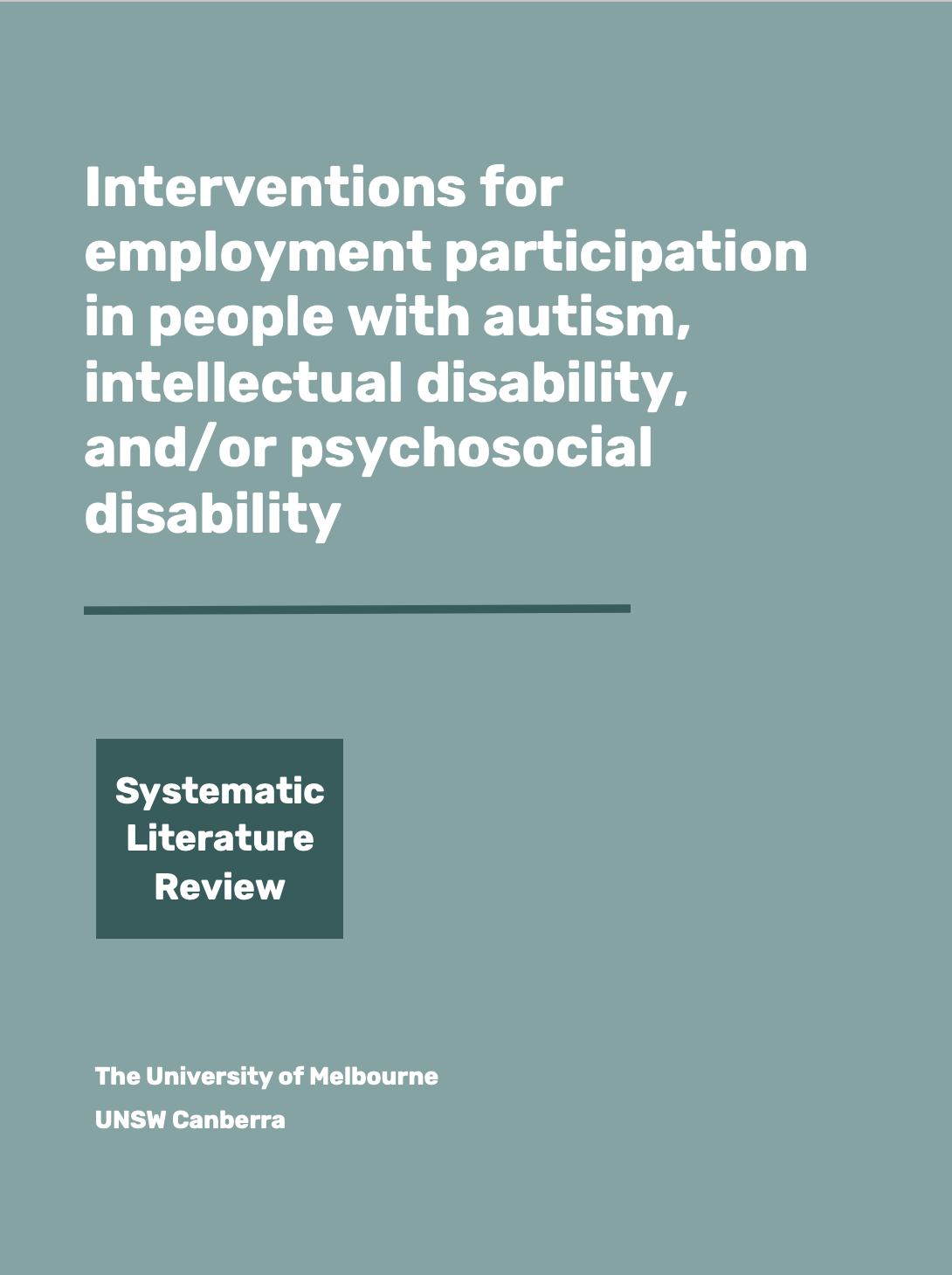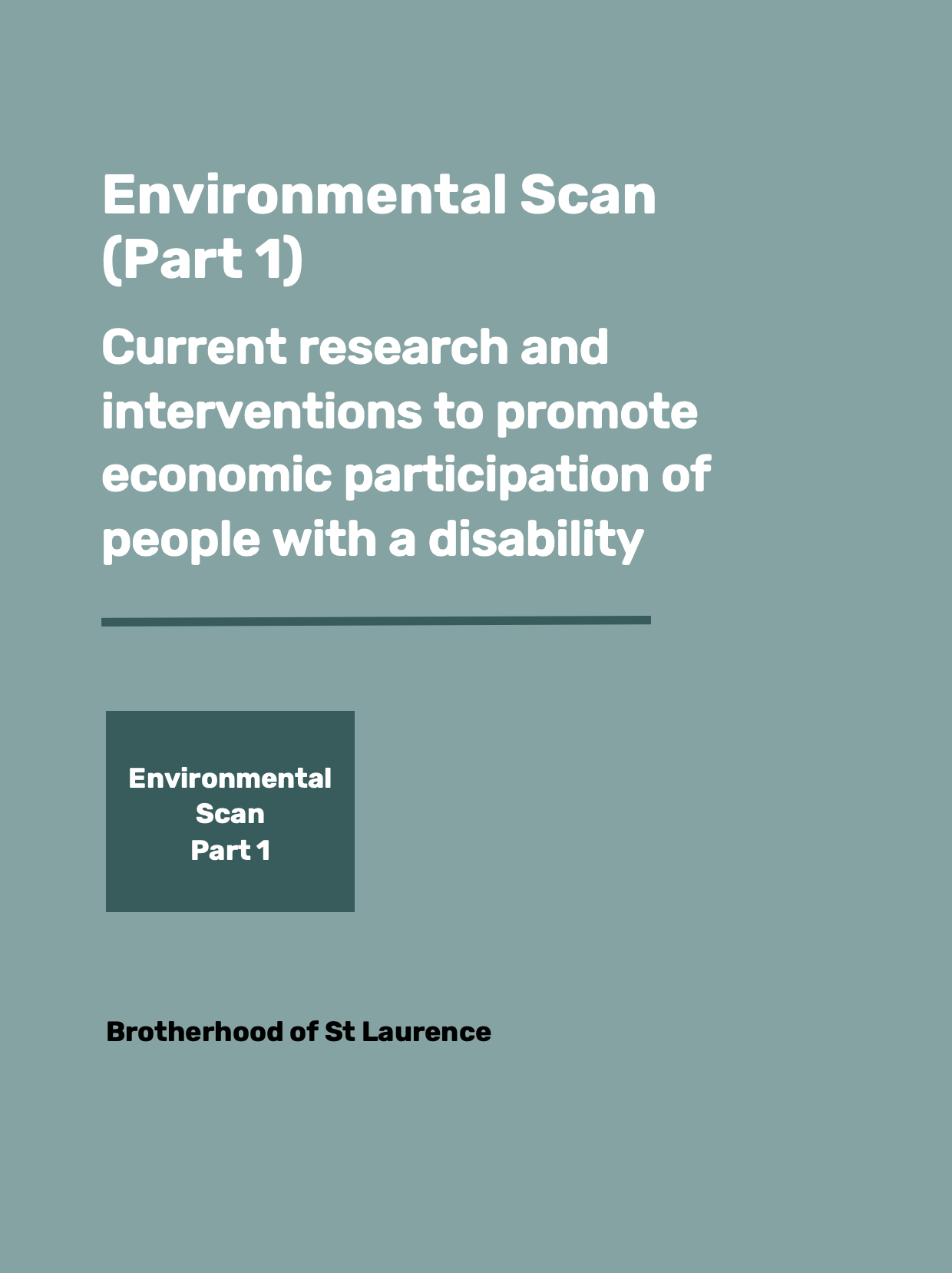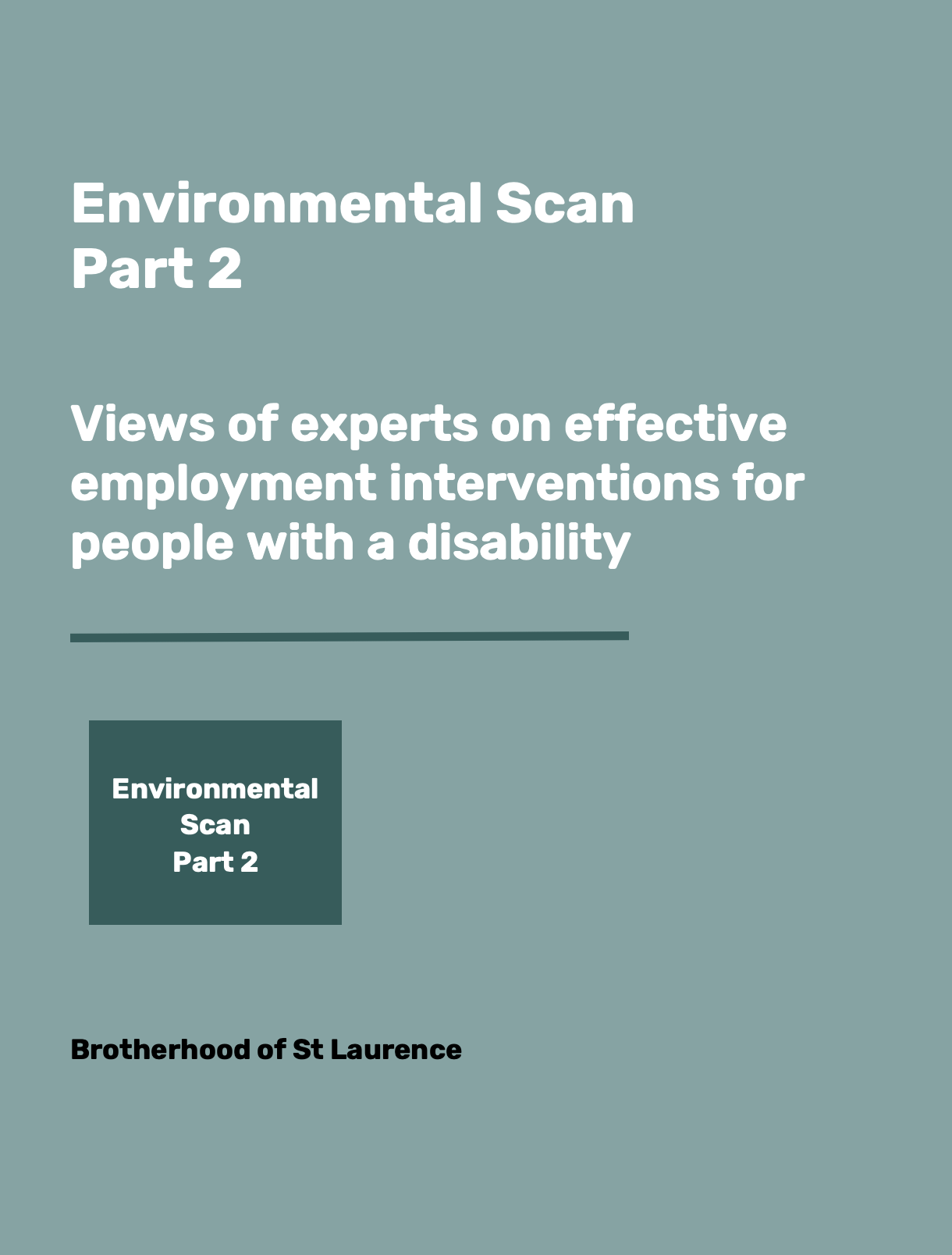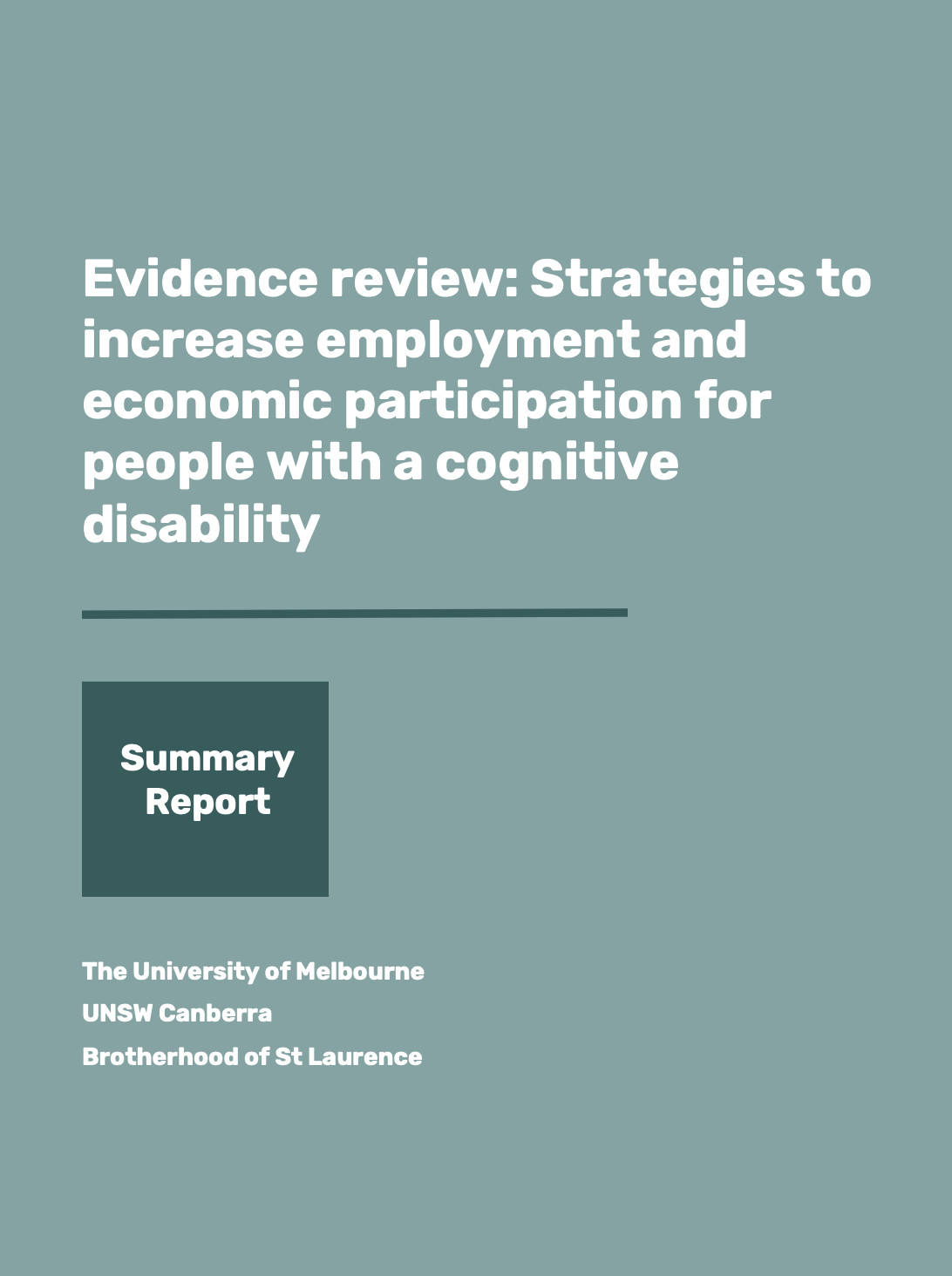Economic Participation and Employment for People with Disability
Project Details
The National Disability Insurance Agency (NDIA) commissioned us to research what helps people with disability find and keep a job.
The research focused on employment support for people with:
- autism
- intellectual disability
- psychosocial disability.
What did the research involve?
We worked in partnership with the University of New South Wales and Brotherhood of St Laurence to carry out this research.
The research included four separate parts:
- An evidence review of how employment programs are described.
- A systematic review of national and international RCTS of employment programs to find out which programs work best.
- Identification of current employment programs in Australia and interviews with academics and senior government and non-government staff working in employment for people with disability.
- Mapping the evidence.
Research findings
The review found 14 different types of employment programs that help people with disability find and keep a job. These were grouped into three categories:
- Supply side: programs designed to build the skills of an individual looking for work so they become (more) ready and able to find a job. These types of programs can also provide support employers to employ a person with disability.
- Demand side: programs designed to create work opportunities for people with disability.
- Bridging: programs that match a person with disability to appropriate work opportunities and provide support to both the person and their employer to access and maintain that employment
Some employment programs may sit in more than one category.
Most of the research related to building the capacity of people with disability or the employer for people with psychosocial disability. And, most of the supply-side activities were vocational programs which teach a person with disability work-related skills that prepare them to find and keep a job.
The review found many programs that were successful in helping people find a job.
Employment support for people with psychosocial disability
Most evidence of benefit was found in Individualised Placement Support, a program for people with psychosocial disability. Individualised Placement Support combines vocational training and employment support with mental health support.
The evidence suggests that Individualised Placement Support works best when extra support is provided. Extra support may include:
- Career advice that builds a person’s knowledge of job opportunities and looking for work. This is sometimes called a Job Coach.
- Career mentoring that helps people with psychosocial disability to find a job and feel positive about work.
- Online support for young people with psychosocial disability to progress towards a work or study goal.
Employment support for people with autism
For young people with autism, there was some evidence that showed programs that integrate ‘work training’ into a person’s final years of school can help improve work readiness.
Employment support for people with intellectual disability
We did not find any research trials focused on employment programs for people with intellectual disability.
Other employment programs and approaches that show promise
The evidence review also identified some programs that show promise for people with autism, intellectual disability or psychosocial disability. Combination supply, demand and bridging approaches may also be valuable in helping participants find and keep a job.
- Vocational programs that are integrated into workplaces and provide training and skill development relevant to the job. Ongoing support to both the person with a disability and the employer.
- Social enterprises that focus on building skills of people with disability to help them enter the mainstream job market. They provide structured training and paid employment, and help people to join the workforce through work experience or work placement.
- Customised employment, which involves working with the person with an intellectual disability and the employer to create jobs that are best matched to the skills and goals of the person. These programs focus on how a person’s strengths and interests may benefit an employer. They are becoming more common in Australia but haven’t been evaluated as yet.
We need to continue working with people with disability, employers, government departments and other stakeholders to generate high quality evidence and foster best practice.
Improving employment outcomes needs a combination of supply, demand and bridging approaches. This may include:
- Building the capacity of people with disability to find work and the capacity of employers to match or create job opportunities.
- Ensuring programs are guided by principles that put the person at the centre.
- Having inclusive workplaces designed together by employers and people with disability.
- Promoting programs where people learn the job skills they need in their workplace, rather than training people in another setting.
- Offering flexible working conditions that consider the changing needs of people with a psychosocial disability.
- Offering opportunity for service providers to share with each other about what works.
Funding
The Economic Participation and Employment project was funded by the National Disability Insurance Agency (NDIA). The research was conducted by researchers at the Disability and Health Unit within the Melbourne School of Population and Global Health at the University of Melbourne, the Brotherhood of St Laurence and the University of New South Wales Public Service Research Group.
Research Outcomes
The Summary Report brings together the findings from each of the research parts.
The Plain Language Summary is available on the NDIS website
The Technical reports below provide a detailed account of the methods and findings.


Download Environmental Scan (Part 1)

Download Environmental Scan (Part 2)
Research Publications
- Kavanagh A, Brown D, Dickinson H, Mallett S, Marck C & Weld-Blundell I (2021). Evidence review: strategies to increase employment and economic participation for people with a cognitive disability – Summary Report. Melbourne: The University of Melbourne.
- Kavanagh A, Brown D, Dickinson H, Mallett S, Marck C & Weld-Blundell I (2021). Evidence review: strategies to increase employment and economic participation for people with a cognitive disability – Plain Language Summary. Melbourne: The University of Melbourne.
- Weld-Blundell I, Shields M, Davy L, Dickinson H, Kavanagh A & Marck CH (2021). Interventions for employment participation in people with autism, intellectual disability, and/or psychosocial disability: a systematic literature review. Melbourne: University of Melbourne and UNSW Canberra.
- a) Brown D & Mallett S (2021). Environmental Scan Part 1: Current research and evaluation to promote economic participation of people with disability. Melbourne: Brotherhood of St Laurence.
b) Mallett S, Brown D & Finnis J (2021). Environmental Scan Part 2: Views of experts on effective employment interventions for people with disability. Melbourne: Brotherhood of St Laurence.
Research Group
School Research Themes
Disparities, disadvantage and effective health care
Key Contact
For further information about this research, please contact the research group leader.
MDHS Research library
Explore by researcher, school, project or topic.
